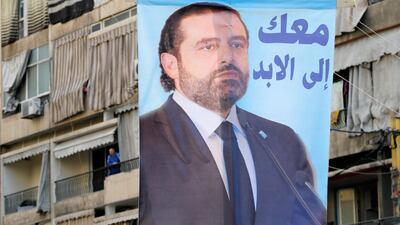The European Union on Wednesday affirmed support for Lebanon following the resignation of prime minister Saad Al Hariri, echoing America's backing for the Beirut government which Saudi Arabia has accused of declaring war.
The EU ambassadors said they reaffirmed their "strong support for the continued unity, stability, sovereignty, and security of Lebanon and its people" and called "on all sides to pursue constructive dialogue and to build on the work achieved in the last 11 months towards strengthening Lebanon's institutions and preparing parliamentary elections in early 2018, in adherence with the Constitution."
Statements of support from EU ambassadors to Lebanon and the US state department struck a sharply different tone to Saudi Arabia, which considers Lebanon a hostile nation because of Hizbollah, which is backed by Saudi's archenemy, Iran.
The US state department also said its "good relationship" with the government of Lebanon would not change. "We'll continue to just follow and monitor the situation there," said spokeswoman Heather Nauert. She was not aware of any plans to educe or suspend the estimated $70 million the US grants to the Lebanese military
She also urged the international community to "respect fully" Lebanon's "legitimate institutions" as well as its sovereignty and political independence, while remaining mindful of the fact that the US has designated Iran-backed Hizbollah as a terrorist organisation.
Lebanon has also received significant Western aid to help it cope with hosting 1.5 million Syrian refugees, equivalent to around a quarter of the population.
The country has been pitched into deep crisis since the Saudi-allied Mr Hariri resigned on Saturday in a speech delivered from Saudi Arabia in which he accused Hizbollah and Iran of sowing strife in the Arab world and also said he feared assassination. The circumstances surrounding his sudden resignation have given rise to speculation in Lebanon that he had been caught up in a high-level anti-corruption purge in Saudi Arabia, where his family made their fortune, and coerced into resigning.
Saudi Arabia has denied this along with reports that it has placed Mr Hariri under house arrest.
The move has pulled Lebanon back to the forefront of a regional struggle between the Sunni monarchy of Saudi Arabia and the Shiite Islamist government of Iran, a rivalry which has also swept through Syria, Iraq, Bahrain and Yemen.
Founded by the Iranian Revolutionary Guards in 1982, Hizbollah is the most powerful group in Lebanon, commanding great influence in government and out-gunning the national military. Neither Hizbollah nor the Lebanese government have responded to accusations made by Saudi Gulf affairs minister Thamer Al-Sabhan that both had declared war on the kingdom.
On Wednesday, the president of Iran, Hassan Rouhani, hit back at Saudi Arabia over what he called "unprecedented" interference in Lebanese affairs and added his voice to those who suspect the kingdom forced Mr Hariri to resign.
"Why are you interfering with Lebanon's internal affairs and governance?" said a post on Mr Rouhani's official website."There is no case in history that a country forces another one's authority to resign only to interfere (in) their internal affairs. This is an unprecedented event in history."
His remarks followed a phone call to his Lebanese counterpart the previous day, in which he pledged Tehran's support for Lebanon.
________________
Read more
Sheikh Mohammed bin Zayed meets with Lebanon's Hariri
Saad Hariri's resignation was a shock, but what will happen next?
________________
President Michel Aoun, a Hizbollah ally who took office last year, has refused to accept Mr Hariri's resignation, saying he first wants him to return to Lebanon so he can meet him in person to understand the reasons. The speaker of the parliament, Nabih Berri, says the coalition government led by Mr Hariri remains in office.
Meanwhile, US ambassador to the UN Nikki Haley accused Iran of supplying the Houthi rebels in Yemen with the missile that was launched from Yemen into Saudi Arabia in July.
“The information shows that the missile was an Iranian Qiam — a type of weapon that had not been present in Yemen before the conflict,” she said.
“By providing these types of weapons to the Houthi militias in Yemen, Iran’s Islamic Revolutionary Guard Corps is violating two UN resolutions simultaneously.
“We encourage the United Nations and international partners to take necessary action to hold the Iranian regime accountable for these violations.”
Ms Haley also said that the Houthi-launched ballistic missile that was intercepted by the Saudi authorities over Riyadh on November 4 "may also be of Iranian origin".
Additional reporting by Reuters


